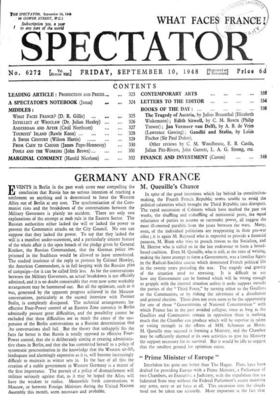M. Queuille's Chance
In spite of the good intentions which lay behind its constitution- making, the Fourth French ,Republic seems unable to avoid the political calamities which brought the Third Republic into disrepute. The rapid succession of Cabinets which have marked the past six weeks, the shuffling and reshuffling of ministerial posts, the equal reluctance of parties to assume or surrender power, all suggest the most ill-omened parallels from the years between the wars. Many, even, of the individual politicians are reappearing in their pre-war roles ; it is again M. Reynaud who is expected to provide a financial panacea, M. Blum who tries to preach reason to the Socialists, and M. Herriot who is called on in the last endeavour to form a broad- based coalition. Even M. Queuille, who is still, at the time of writing, making the latest attempt to form a Government, was a familiar figure in the Radical-Socialist caucus which dominated French political life in the twenty years preceding the war. The tragedy and gravity of the situation need no stressing. It is difficult to see how any Government can be formed which will be strong enough to grapple with the internal situation unless it seeks support outside the parties of the " Third Force," by turning either to the Gaullists or the Communists, or by risking the adventure of a dissolution and general election. There does not even seem to be the opportunity for one of those " Governments of National Concentration " with which France has in the past avoided collapse, since as long as the Gaullists and Communists remain in opposition there is nothing much that the Chamber can produce which will be superior in talent or voting strength to the efforts of MM. Schuman or Marie. M. Queuille may succeed in forming a Ministry, and the Chamber may be sufficiently alarmed at its own activities to give his Ministry the support necessary for its survival. But it would be idle to suggest that the smallest ground for optimism exists.


































